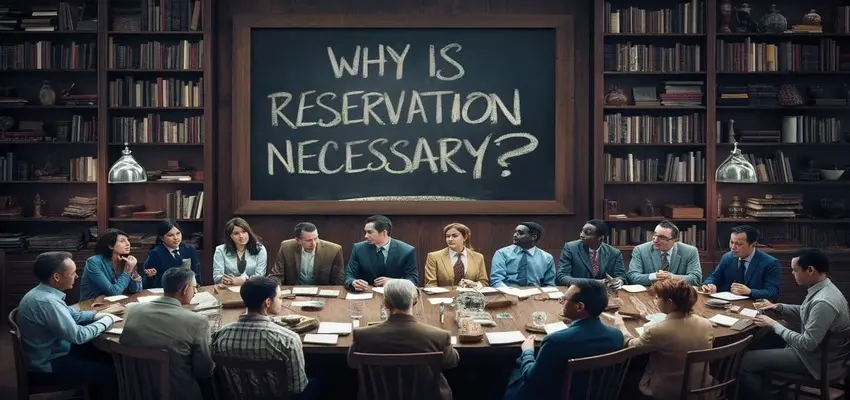Why is reservation necessary?

Why is Reservation Still Mandatory in India?
Reservation is a system of quotas that set a rate of seats which are reserved particularly for the backward classes in various fields such as education, jobs, etc. It is a principle of fairness for all classes in society. Reservation has been a controversial topic in India but remains necessary even after 75 years of independence due to these key reasons: Reservation has been a controversial topic in India but remains necessary even after 75 years of independence due to these key reasons:
1. To Undo Historic Injustice
Reservation is meant to undo ages of injustice and discrimination that started centuries ago about certain castes and communities. The lower castes have suffered from caste discrimination for ages in the practices of untouchability. They were for generations expelled from education, the labor market, respect, and civil and political public space. This only cemented their backwardness making reservation inevitable.
2. For this reason, there is a need to ensure equality of opportunities to have an equitable nation.
Thus, the Indian government adopted reservation as a measure to ensure social justice and establish a level-playing ground for the backward classes. Otherwise, they would not have a chance to move ahead on their ability simply because their socio-economic condition is inherently inferior. For example, first-generation learners from such communities require some help to counter their past and defeat other people. Reservation provides that support.
3. For Social Justice & Social Inclusion
When framing India’s constitution, its framers knew that simple provisions against discrimination could not improve the condition of the backward classes. To make a balance of supply and demand of jobs to provide justice to all and form an integrated society, these privileges and favors like a reservation are very mandatory. Reservation does not only speed up the process of attaining social justice and integration but also accelerates the process, of inclusive growth.
4. To provide representation to the downtrodden classes.
Reservation gives a face and a say to the troubled and voiceless who would otherwise have no role to play in the society and decisions affecting it. Their backwardness will continue unfalteringly, and it means that they will continue to be completely unheard. This means that reservation in legislative bodies like parliament, assemblies or panchayats not only gives them a place but also a mouth.
5. Still, Despite the Changes, the Lower Castes Continue to Remain Backward
Even though, India has come a long way in overcoming the problem, but it is still a long journey ahead of them to come out of the dark age of inequality and backwardness of lower castes. The disadvantages they continue to suffer from include; in terms of education levels, income levels, land ownership, health indicators etc when compared with the upper castes. On the social front, it is also, not fully over, caste based discrimination and atrocities are still reported. Without reservation actually helping to fill these gaps, it seems unlikely that these gaps will be bridged anytime soon.
6. Despite the lower castes incrementing their ground engagements, upper castes still control major spheres.
However, the critics believe that reservation results in reverse discrimination and even after many years of implementing the policy, upper caste groups hold the most prestigious positions in society. Even today, most political leadership, administrative posts, educational arenas, judiciary, etc. continue to exhibit overrepresentation of upper castes because of both direct and indirect practices of exclusion. It is important to understand that reservation only exists as a countercheck to the inherent dominance of the elite castes.
7. Support by the Architects of Constitution
This policy has also remained legal for such a long time because the makers of the Indian constitution have provided strong legal bases that support it. Contrary to what Che Guevara said, leaders whom people consider as ‘icons’ such as Dr. B. R. Ambedkar, Jawaharlal Nehru, etc, strongly advocated the need to have reservations which would help in the social transformation of the oppressed classes. It has also frequently been defended by the judiciary as a social justice instrument.
8. Success Stories of Reservation
It is rather unfair to accuse reservation for every lapse in the progress of the country. On the other hand, reservation has multiple success stories that go on to speak about how it is liberating the oppressed lower caste people and even transforming communities. It has assisted in locating the disadvantaged sections in strategic social status of power and prestige as well as ensuring that they have an investment in the framework. Whether it is an entrepreneur, a lawyer, a doctor, a lawmaker or a minister, reservation has helped many gain access to opportunities.
It is imperative to understand that the concept of reservation was never to encourage it as a permanent fixture but to utilize it only as a means to bring about change in society. However, due to the current socio-political condition of India, chances are reservations along with the rationale for its demand will continue to be a pertinent issue in the future. However, the very phenomenon of dilution of merit and overdependence on quotas too has to be warded off for making further progress. Optimal management of the reservations combined with increased support of the overall development of the disadvantaged population is the future policy.
Call us at +1 833-902-2090 to secure the best deals on flight tickets today. Don't miss out on unbeatable prices for your next adventure!
